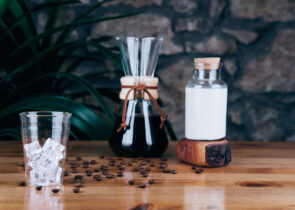It’s safe to say that everyone on the Roasty team is a regular coffee drinker. We go to our local coffee shops for energy boosts on busy mornings. We have at-home brewing routines. We know which roasts and origins we like best. We drink a lot of coffee.
But with a lot of coffee comes a lot of caffeine, and that causes unwanted symptoms like jitters, insomnia, and headaches. If your daily cup (or two…or three…) leaves you experiencing the negative effects of caffeine, it might be time to switch to decaffeinated coffee.
Read on to learn more about the risks and benefits of decaf coffee so you can make an informed decision about whether it’s what’s best for your coffee consumption habits.

Key Takeaways
- Decaf beans offer coffee lovers the ritual and taste of joe without the high caffeine content. But since it’s not entirely free of the stimulant, you may still experience minimal side effects.
- Decaffeination methods vary, with some using chemicals, potentially leaving traces in the coffee, and others employing chemical-free water processes that nearly eliminate caffeine.
- Switching to decaf coffee can be a positive step toward reducing caffeine’s adverse side effects.
What Is Decaf Coffee?
Decaf coffee refers to any that’s been through a process to remove 92 to 95 percent of the caffeine from the beans. Since it’s not usually completely caffeine-free, it’s not a perfect solution for anyone trying to cut caffeine out of their diet. However, it is a step in the right direction.
Pros and Cons of Decaf Coffee
| Pros | Cons |
|---|---|
| Decaf coffee has smaller amounts of caffeine than regular coffee. You can drink it after dinner and still get plenty of sleep, and individuals with caffeine sensitivity won't react poorly to it. | NewScientist notes that decaffeinated options often contain lower-quality coffee beans with higher fat content, which elevate cholesterol levels. |
| A cup of decaf coffee won't leave you with any of caffeine's negative side effects, like a headache, heart palpitations, caffeine withdrawal, or insomnia. | The decaffeinating process often involves chemicals that impart a bitter, artificial-tasting flavor. |
| Decaf coffee has high free radical-fighting and disease-preventing antioxidant levels. | All-natural decaffeination processes exist, but those are much more expensive for the consumer. |
| Drinking decaf (decreasing your daily intake of caffeine in general) can lead to improved sleep quality and healthier, more regular sleep patterns. | Some coffee drinkers say the taste of coffee changes when it's decaffeinated. One Redditor called it "flat and stale" compared to its caffeinated counterpart. |
| Excessive amounts of caffeine can result in digestive discomfort like acid reflux. A cup of decaf can be gentler on the stomach and digestive system. | Coffee is such a popular beverage because its caffeine provides a nice energy boost. Since decaf joe has little or none of the popular stimulant, don't expect it to give you the same alertness or energy that fully caffeinated coffee does. |
Frequently Asked Questions
How Is Decaf Different From Regular Coffee?
The fundamental difference between regular coffee beans and decaffeinated ones is the process they undergo pre-roasting. Otherwise, there’s no nutritional difference between your regular favorite bag of beans and decaf coffee.
Some decaf roasters might use robusta beans. You’ll want to steer clear of those. Robusta coffee beans present health risks that might cancel out decaf coffee’s benefits.
How Is Decaf Coffee Made?
Roasters use several methods to remove caffeine from coffee beans, but the two most common are water processing and chemical processing.
In the more widely used chemical process, coffee producers soak the beans in water before adding chemical or organic solvents. Methylene chloride is usually the chemical of choice. These solvents help draw out the caffeine from the bean and stick it to the solvent. Then, the beans return to the water to wash off the solvents.
While this decaffeination process has been deemed safe by the FDA, there is still a chance your coffee may contain residual methylene chloride. Consider that when choosing your decaf coffee.
Water processing is the second most common decaffeination process, and it’s simple. With a combination of water, time, and a carbon filtration system, green coffee beans get “washed,” while diffusion pulls caffeine out of the bean. Water processing is more effective than chemical processing, removing 99.9 percent of the caffeine. The Swiss Water Process is the most popular water-centric decaffeination method — we share more about that here.
Is Decaf Coffee Better for You?
Caffeine is a hotly debated substance in the medical community. Healthline declares that a little caffeine can go a long way in improving energy levels, controlling your appetite, and supporting heart health. Based on that info, you might say that cups of coffee with caffeine are the way to go.
But you can have too much of a good thing. Excess caffeine consumption results in adverse effects, including but not limited to headaches, heart palpitations, insomnia, and high blood pressure. So, that means cups of decaf coffee are better, right?
Not necessarily.
Decaf coffee can be less healthy than regular coffee for several reasons, including the use of robusta beans. Arabica beans are by far the most popular for regular coffee. But decaf coffee options often consist of other varieties, specifically robusta, that are high in fat and linked to elevated cholesterol levels, according to Science Daily.
Decaf coffee enthusiasts can avoid this risk by only buying 100 percent arabica beans from trusted, reputable roasts and purchasing only all-natural, water-processed decaf to avoid consuming trace amounts of chemical solvents.
Decaf Coffee: Good or Bad?
Decaf has some advantages over regular coffee, especially for Java drinkers trying to avoid excessive caffeine consumption. But it also has several drawbacks, making it challenging to recommend decaf as an end-all-be-all solution to your caffeine woes.
Ultimately, only you can decide whether the decaf or fully caffeinated version of this beloved beverage is better for you. If you want to lower your daily caffeine intake but worry about the negative effects of decaf coffee — inflated cholesterol levels, low-quality beans, a bitter taste, etc. — it might be a good idea to look into low-caffeine or decaf teas instead.
Experiment, shop around, and research products thoroughly so you can make an informed decision.
Happy (de)Caffeinating!







